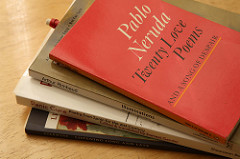By LUIS MUÑOZ
POETRY NEVER STOPS DEFINING AND REDEFINING ITS TERRAIN
Poetry never stops defining and redefining its terrain. It has done so throughout history, since Aristotle, Cascales, or Antonio Minturno. But this task, which seems like a kind of prison sentence, is also a fountain of intensity, a force.
Poetry is obligated to move, like a nomadic tribe. And in that motion, in the stops along that route that so often has the character of an escape and of exhaustion, it paradoxically becomes invigorated, fortified.
Poetry leaves its marks on history, and in doing so leaves marks in front of itself. The fingerprint of a poet is in that poet’s struggle to mark out the territory of the poetry of his time.
Since the end of the nineteenth century, if we can refer to the poetry I prefer, poetry has modulated its intonation—its intertwined specialty and its temporality—in its capacity to create symbols—episodes, stories, characters, images…the fleeting arithmetics that reveal something of the function of human nature.
But the poetry I prefer defines its situation as a zone of intersection between the world of what one has and the world that escapes us, between what one can know more or less logically and what one can only know intuitively. The poet is the hunter of symbols in this zone of intersection, which is also the zone that matches the same artifact in the verbal world of concepts, of attachments and sensations. A hunter, then, of correspondences, to use Baudelaire’s beloved word, who, with the trajectory of his shots, unites.
Translated from the Spanish by Curtis Bauer
LA POESÍA NO PUEDE DEJAR DE DEFINIR Y REDEFINIR SU TERRITORIO
La poesía no puede dejar de definiry redefinir su territorio. Lo ha hecho a lo largo y ancho de su historia desde Aristóteles, Cascales o Sebastiano Minturno. Pero esa tarea, que parece una especie de condena, es también una fuente de intensidad, una fuerza.
La poesía está obligada a moverse, como un pueblo nómada. Y en el trasiego, en las paradas de ese camino, que tantas veces tiene el carácter de una huida y de un agotamiento, paradójicamente se vigoriza, se tonifica.
La poesía deja sus marcas en la historia, y al hacerlo las deja también frente a sí misma. La digitación personal de un poeta está en su esfuerzo por marcar el territorio de la poesía de su tiempo.
Desde finales del siglo XIX, si podemos referirnos a la que prefiero, la poesía modula su entonación—su especialidad y su temporalidad imbricadas—en la capacidad para crear símbolos—episodios, historias, personajes, imágenes—, aritméticas pasajeras que revelen algo del funcionamiento de la naturaleza humana.
Pero la poesía que prefiero define su situación como una zona de intersección entre el mundo de lo que se tiene y el mundo que se escapa de nosotros, entre lo que puede conocerse de manera más o menos lógica y lo que solo puede conocerse de manera intuitiva. El poeta es el cazador de símbolos de esa zona de intersección, que es también la que hace coincidir en un mismo artefacto verbal el mundo de los conceptos, de las querencias y el de las sensaciones. Un cazador, entonces, de correspondencias, por utilizar la palabra dilecta de Baudelaire, que con la trayectoria de sus disparos, une.
Luis Muñoz is the author of five poetry collections, most recently Querido silencio(Dear Silence) and Limpiar pescado. Poesía reunida (Cleaning Fish: Collected Poetry). He has received several prizes for his work, including the Generación del 27 and Ojo Crítico awards. For ten years he was the literary advisor for the Residencia de Estudiantes in Madrid, and since 2012 he has taught in the MFA in Spanish Creative Writing program at the University of Iowa. He divides his time between Iowa City and Madrid.
[Purchase your copy of Issue 09 here.]




